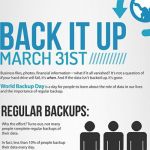Directive Blogs
Do you know exactly how much a disaster incident could cost your business? You might think of IT as your reactive safety net, only taking action when something goes wrong or breaks, but here’s the problem… By the time your server crashes, or your office is underwater, or you’re dealing with a ransomware attack, it’s already too late.
The concept of backups isn’t new. A lot of people have a spare key, and the idea of a spare tire is pretty universally known. While either example could easily make or break someone’s day, the stakes are exponentially higher when business data is involved.
This is why a comprehensive business continuity plan—including a disaster recovery strategy, complete with backup readiness—is essential.
A backup does not truly exist until you have successfully restored from it. This is the hard truth of information technology. Many business owners and internal teams rely on the green checkmark in their software dashboard to signify safety. However, that status light can be misleading, masking deep-seated issues that only appear when a crisis begins.
It’s easy to think of IT as a money sink. No matter how much you spend, there’s always some issue that surfaces, requiring a considerable investment on your part. But what if we told you that you don’t have to worry about IT issues?
With the right approach, you can transition from the traditional reactive method of IT maintenance to proactive IT solutions, designed to save you money.
If you put yourself in the shoes of an insurance company, you might find yourself thinking twice about protecting someone who actively partakes in risky behavior. The same can be said for a business insurance provider, particularly when the behavior can easily be prevented through proactive and preventative measures. This is why many insurance providers are establishing minimum safeguards and compliance requirements, if only to protect their own skins.
Building a gingerbread house is a perennial tradition in many, many households. Those with experience know that precise, careful preparation leads to a successful, long-lasting final product, while rushing and cutting corners usually leave you with a crumbling, fragile mess.
Much of the same can be said of your business’ data. This essential operational resource is terrifyingly susceptible to a litany of threats and issues that could easily bring your processes tumbling down… hence, why the 3-2-1 Backup Rule is a core element of successful business continuity.
Let’s take a moment to consider the recipe for a reliable, disaster-proof backup, and how it aligns with the process of making a gingerbread house.
Remember tape backup? For some SMBs who have moved on, this form of data backup is a clunky and frustrating relic of the past. But if you aren’t remembering it and are instead still dealing with it, you might be experiencing some operational frustrations of your own. Today, we want to cover a better solution—one that takes the unpredictability out of business continuity.
It is remarkable how much more capacity our data storage tools have than they had upon their initial invention, and how much data we’ve amassed in that time. The first-ever commercial hard drive was the size of two refrigerators, and held a mere five megabytes of data. For context, that’s about five photographs. Today, hard drives hold exponentially more data, and it is critical that you are doing everything you can to protect this data from any circumstance, from fire, severe weather, or cyberattack.
So, are you? Too many business owners aren’t sure… but there’s a way you can be.
What would you do if your entire infrastructure were impacted by ransomware all at once? Do you have a contingency in place to address this risk, or are you going to “wing it” in the face of such a threat? The smart answer is that you’ll be prepared, and a data backup and disaster recovery solution (or BDR) plan will help you do just that.
Any business can face a variety of disruptions, from natural disasters to cyberattacks. While many organizations understand the importance of preparing for the unexpected, not all of them have a solid plan in place. A well-crafted business continuity plan (BCP) is crucial for protecting your employees, customers, and bottom line.
Here are some key dos and don'ts to consider when creating your business continuity strategy.
You know your business needs data backup, but do you understand why? Simply put, your business is at risk of total annihilation if it doesn’t have a plan in place to recover lost data, and you don’t want that impending doom hanging over your head. If you’re wondering where to get started, here are three types of data that you should absolutely prioritize with your backups.
That said, you want to back up all data if you can, but these are three that we think are especially important to consider.
We need to talk about something that is as exciting as watching water boil, but it might just save your entire business one day: backing up your data.
I know, I know. You're busy doing your thing, closing deals, and you’re busy. The last thing on your mind is where your files are outside of your server. The truth is, it’s not very interesting, but it sure is important.
We’ve all felt that mini-panic that happens when our personal technology glitches. Not a great feeling. That’s just if your microwave is on the fritz, or your smartphone fell in the toilet. We all depend on multiple devices each day, but for a business owner who is responsible for so much, technology failure really isn’t an option. This month, we thought we’d go into how technology outages can impact a business to give you a better perspective of just how much is at stake.
Technology is meant to be the wind in your business' sails, propelling you forward, simplifying tasks, and making operations smoother than a freshly paved highway, right? Sometimes, it is! Other times, it feels more like a mischievous gremlin has been let loose in the engine room, and certain seemingly small habits can escalate into full-blown operational nightmares.
Here at Directive, we've seen a pattern or two. Today, let's shine a spotlight on three common technology missteps that might be silently sabotaging your productivity or even worse, leaving your digital doors wide open.
Do you know what goes into a successful data backup strategy? If not, know that your business depends on these contingencies to confidently face the challenges of today’s business world. Today, we’re breaking down the essentials of a sound backup strategy—and trust us when we say it’s more complicated than you think.
There are, plainly and simply, too many ways that a modern small or medium-sized business can experience an issue that puts their IT out of commission in one way or another. Each one can hit one of these businesses particularly hard in the wallet.
Let’s review some today and discuss how they can be resolved.
Cyberthreats aren’t just occasional inconveniences, especially nowadays. They are constant, evolving, and some are so highly sophisticated that you can hardly blame yourself if you fall victim to them. This is why proactivity is so important. Businesses that take a reactive approach to cybersecurity find themselves in a never-ending cycle of damage control. Without a purposeful cybersecurity strategy, any organization faces recurring breaches, data loss, and ultimately a situation where customer distrust can result in the company's financial ruin. This month, we thought we would take a look at why having a comprehensive cybersecurity strategy that addresses these risks is so critical for the modern business to accomplish.
When your business’ data is so crucial to your successful operations, there are certain precautions that you simply need to take for the sake of your business’ longevity. One such precaution: data backup.
Your data is the gas that powers your business’ engine, whether you’re referring to project files and intellectual property or financial info and customer records. As such, imagine what it would mean if your business ran out of gas… or, more accurately, it was siphoned out.
There are plenty of reasons why a business might lose some or all of its data, ranging from cyberattacks to hardware failure. Unfortunately, there isn’t any real reason your business won’t be one of the unlucky ones.
This makes it imperative that you prepare for this eventuality. Let’s discuss how to do so with the help of data redundancy.
Today—March 31st—is World Backup Day, an annual reminder to think about how well you’re protecting your data. Is your business prepared to prevent—or recover from—a data loss disaster? And while you’re at it, have you taken steps to back up your personal information as well?
Running a business is basically a never-ending series of potential disasters just waiting to happen. Some are easy to fix, change a process here, tweak a strategy there—but others? They can completely derail your operations if you’re not prepared. That’s where smart technology steps in to save the day.
Let’s look at some nightmare scenarios that could spell disaster unless you have the right IT in place.
Running a business is already confusing enough without worrying about security at all times. Whether you’re a small business owner or a multi-level enterprise, security is just as important for all the same reasons. Today, we want to share a couple of security strategies you can implement today to feel better about the current state of your infrastructure moving forward.
Every business’ worst nightmare is a data loss incident, and if you’re caught unawares, such an incident can set you back financially and operationally for months. Today, we want to cover some of the common data your business collects that you absolutely need to have backed up. If you don’t, you could become subject to serious fines due to regulations and other industry-specific mandates.
 Data Backup and Disaster Recovery (BDR) isn’t your average data backup solution. In fact, it’s far from any traditional backup tool that you might have used in recent years. Here’s how BDR is changing the way that organizations approach business continuity and ensuring their continued success and sustainability.
Data Backup and Disaster Recovery (BDR) isn’t your average data backup solution. In fact, it’s far from any traditional backup tool that you might have used in recent years. Here’s how BDR is changing the way that organizations approach business continuity and ensuring their continued success and sustainability.
To keep your business running smoothly, even if something goes wrong—like a power outage, cyberattack, or other disaster—you need a reliable way to protect your data. That’s where data backup comes in. It’s important to make sure your backup is thorough and trustworthy so you can recover if things go south.
Other than the innovative jump from tape, data backup hasn’t seen too many great leaps forward, so to speak. Sure, businesses don’t have to worry about resource-intensive manual backups anymore, but the standard approach is so rock-solid that innovation isn’t necessarily needed at this point. Today, we are exploring the backup and disaster recovery process and how modern-day solutions have made an effective tool even better.
Nostalgia is a powerful force. It can drive us to look to the past for things we once loved, such as the music we listened to over the years. However, what if the music you loved was lost forever?
This could be the case for many, as older hard drives that archive this music have been discovered to have failed. Let’s examine the situation to see what lessons any small-to-medium-sized business can learn.
Digital storage has exploded, in no uncertain terms, over the last few decades. While hard disk drives (HDDs) were the predominant storage format for most of that time, today’s faster and hardier solid-state drives (or SSDs) are becoming more affordable and popular.
However, there are still plenty of HDDs out there, all far more prone to breaking than their more advanced counterparts. So, how can you tell when a hard drive failure is pending?
We have frequently espoused the benefits of data backups, referring to how critical they are should your business experience a disaster at any scale. However, there is always the concern that your backups could also be altered negatively. This is one reason that immutable backups exist.
Let’s take a few moments to examine the concept of an immutable backup and its benefits.
Business can get messy, particularly when variables outside your control are involved, which could spell doom for your organization. We’re talking, of course, about instances where your organization might be under a particularly large threat—instances where your data is at risk, which could jeopardize your future. Thankfully, there are options to mitigate this risk.
Nowadays, businesses need to be prepared for almost every circumstance. You may have heard the term “BDR” used to describe a method of attaining this level of preparation. We wanted to discuss this term in more depth, covering what it refers to and what you need to do to protect your business should BDR be right for you.
Spoiler alert: it very much is.
How often do you think about your data backup system? If you’re like most businesses, it’s something that you will likely set up, then quickly forget about, provided you haven’t had to use it. Still, having one is essential to any modern business, and building it with clear outcomes and metrics in mind will help you make your data backup system more effective for the moments when you’re glad you have it.
You don’t need us to tell you that ransomware is a problem (or maybe you do–we mean, it’s a huge problem). It’s dangerous to both businesses and individuals, and it has become such a common threat that all organizations need to have a plan in place to address it with their staff. Today, we want to highlight a three-part strategy that you can use to approach ransomware in the most secure way possible.
We often discuss data backup and disaster recovery on our blog, and you may even be familiar with some of the terms and practices we throw around. Today, we want to take a closer look at the 3-2-1 rule and how it impacts your business’ ability to recover in the face of a disaster. Let’s dive in and see how the 3-2-1 rule can make or break your company’s data infrastructure.
When you suffer a data breach, you might wonder how you can possibly come back from such an event, especially if it leads to a network compromise. Can your business rebound effectively, and if so, what do you need to do to make sure that it doesn’t happen again? It all starts with understanding how much data you need to function, as well as how much downtime you can afford to suffer from.
It doesn’t matter where your business is located; whether it’s a tornado that rolls through your city, a structural fire that renders your office uninhabitable, or a freak snowstorm that brings down power lines or grinds travel to a halt, you’ll want to be ready for it all. We’ll go over what kinds of solutions your business can implement to ensure that no disaster, be it natural or artificial, like a cyberattack, puts a stop to your operations.
Tomorrow, March 31st, is the official World Backup Day, a day intended to remind us all of the importance of taking backups for the sake of data continuity. While this kind of day can be a valuable reminder of a critical best practice, we contend that your awareness of your backup (and the associated maintenance of it) should not be limited to a single day.
World Backup Day is March 31st, each and every year. However, while there is value to having a dedicated holiday to raise awareness of the need for backup, it should not be the only time it is considered. Let’s go over the importance of proper backup practices, just in time for the holiday, so that you can establish the backup that your business needs if it's not already in place.
Because of the protection it can offer your organization, data backup is a necessary tool for you to have—that is, provided it has the requisite security and reliability you’ll need should you ever have to lean on it. Let’s go over a few guidelines to help you be sure that your backup is trustworthy enough to stake your business’ future on.
I hope I don’t have to tell you how important your business’ data is to its continued survival, just as I hope I don’t need to explain why this makes this data a priority to protect, regardless of your business’ size. What I do want to explain is the concept of the 3-2-1 Rule and how it pertains to your data backup, and why we would recommend that one for your business’ purposes.
March 31 is World Backup Day. Data is a commodity, but unlike other commodities--it can be replicated without hurting its value. As a result, data backup has become a critical need for the modern business. World Backup Day has been created to remind people to protect their assets by backing up their files.
Having a comprehensive data backup and recovery strategy in place can absolutely save your business. This means it’s extremely important. Unfortunately, too many businesses don’t consider their backup and recovery systems until it is too late. Let’s unwrap what makes a successful backup and recovery platform work, and how to get one for your business.
Unfortunately, the more people lean on technology, the more data breaches there are. The correlation makes sense, but with so much innovation in data security and data systems, it’s a shame more can’t be done to keep businesses and individuals from losing data to opportunists and scammers. That’s why knowing how to circumvent these forces is essential to keep your data safe. Let’s take a look at how the people that are best at it keep their data secure.
If you look hard enough, there is a “novelty” holiday for just about every day of the year. While many are of the fun and goofy variety, like March 13 being National Earmuff Day and March 28 being National Something On a Stick Day, others are used to remind us of important ideals and practices. Let’s take a few moments to shine a light on those days dedicated to important information technology concepts (even though we’ve technically missed National Technology Day, on January 6, Data Privacy Day, on January 28, and National Clean Out Your Computer Day, on February 8).
As much as you hope it will not happen to your business, a disaster could very well strike at any time—statistics have shown as much to be true. To remove some of the risks associated with disasters and the data loss they lead to; we recommend that you implement BDR into your business continuity strategies.
Know it or not, your business takes in and creates a lot of data. Most of this data, like most items and information, isn’t worth much. Some of it, however, is crucial to your business’ ability to operate. If a situation comes along where you are faced with the prospect of losing your data, it will be much better to have a backup plan in place than not.
Dangerous cyberthreats don’t just affect major businesses—they are just as likely to hit close to home.
In fact, just two weeks ago, a ransomware attack left half of the computers operated by Chenango County held hostage by hackers, who demanded $90,000 to surrender access to the files. Learn how Chenango County was able to say “No” and recover their data.
If you’ve been following us for any amount of time, it is very likely that you have already heard us talk about the importance of a comprehensive data backup strategy. Recent events have made such preparations no less important for you to have in place. Let’s go over some of the key steps that you need to undergo.
Your data is vital for your organization’s continuity. Your data consists of everything from your company documents, accounting records, client contact information, prospects and leads, procedures, and everything else needed for you to keep operations running smoothly. That’s why all businesses need a solid backup solution that is monitored and tested regularly.
Each week, we try to provide some tips to help you out in some way. This time, we want to take a somewhat different approach and instead present you with two potential scenarios that your business could encounter—one with and one without a backup solution in play—and let you see the benefit that our tip this week (protect your business with a backup solution) can present.
Every business needs a continuity plan (BCP) so that if their business is forced to deal with problems that arise for any reason, that they have a working plan to get the business back up and operating as intended quickly. It’s one thing to have it all written down on paper, outlining how things are supposed to go, and quite another thing to have a working strategy when faced with operational interruptions. Today, we’ll go through some of the basics of business continuity to help you understand all that goes into a successful plan.
March 31st is World Backup Day, which makes it the perfect opportunity to share the benefits of implementing a complete backup plan. Unfortunately, the current COVID-19 pandemic and the resultant business interruptions make World Backup Day only too timely this year. Here, we’ll examine how these times make a business continuity strategy and data backup all the more important to have.
Let me ask you this: does your business have a dedicated data backup and disaster recovery system? If not, we need to talk. A comprehensive backup and disaster recovery platform (BDR) can turn out to be one of the most critical parts of managing a business’ IT infrastructure. By having a plan to turn to in the event a serious problem such as ransomware or a natural disaster descends upon your business, you can be better prepared.
Data loss is no joke - and we’ve heard plenty of stories from people who have experienced it firsthand, when personal or business data was lost. We appreciate everyone who shared their experiences with us, and allowed us to post them here. First, we’ll tell the story of someone who learned something in college that wasn’t in the syllabus.
Don’t forget to share your own stories with us in the comments!
Data is of key importance to many modern businesses, and with the help of a managed service provider, it can become even more useful. Here, as we continue our series on the value that a managed service provider can offer you, we’ll focus on the ways that data can be harnessed to your business’ advantage.
When we discuss backup and disaster recovery (BDR), it may seem as though we’re talking about a single process - after all, there’s just one acronym for it. However, the reality is that - while these two processes are related to one another - backup and disaster recovery each require a different preparation process, with different considerations made for each.
Business disasters come in all shapes and sizes, which makes it all the more important that you take the time to prepare for those that your business may be susceptible to. This strategy needs to contain numerous considerations, based on the scenario at hand. After all, there is no shortage of events that can lead to disaster in the business world.
Hurricane season can be a scary time for business owners, as those in at-risk climates can never feel safe from these kinds of unpredictable and devastating storms. In particular, those who aren’t prepared to face this destruction are in considerable danger of having their organizations ended for good following a disaster event like a hurricane. We’ll help you make sure your business doesn’t suffer this same fate the next time it stares down a disaster.
Consumers can now take full advantage of a data backup system that’s both affordable and convenient, allowing them to keep their data as safe as can be in the event of a disaster. While it might not be ideal for business purposes, the average PC user can surely benefit from Google Drive’s new backup system, which takes advantage of the Backup and Sync application.
No business owner likes to think about it, but every business needs to be prepared for the possibility of their data disappearing. Have you taken steps to ensure that, should some disaster strike, you will be prepared to dust yourself off and continue operations? Furthermore, are you sure that your preparations will be sufficient and your data will be preserved?
No business owner wants to experience data loss in any way, shape or form, which is why it’s so crucial that preventive measures are taken. If you don’t have protections in place, you may find yourself out of business due to a data loss disaster. While that’s certainly the worst-case scenario, the other consequences of data loss are downright troublesome in their own right.
When we talk about best practices, we are typically referring to the practices used by successful companies to garner the best results. A new study by Disaster Recovery has shown that, as backup and recovery solutions go, enterprises are providing some pretty disappointing results as many fail to continuously back up their data and it results in additional inherent risk.
Data backup. It’s something that all businesses need, but not all businesses know how to approach the implementation of it. This is largely due to the tendency to underestimate how disastrous data loss scenarios can be for their business. You know how it goes; it’s impossible, until it happens. Thankfully, you can significantly reduce the damage done by data loss incidents with a little bit of preventative, proactive thought and a comprehensive backup system.
Especially with so many people claiming to be tech-savvy, asking a question about IT can be a bit nerve wracking. Because of this hesitation, there are a lot of people who don’t ask questions about technology because they feel like their questions might be stupid. For example, having an updated operating system is a term that is tossed around a lot by IT professionals, and even some not-so-professionals.
Nobody ever wants to admit that their business has a problem with security. Unfortunately, as the one responsible for the future of your organization, you have to consider all possible outcomes of any potential data loss incident. Furthermore, many of these incidents are beyond your control. Thankfully, you can soothe the pain of a data loss disaster by thinking ahead and planning for the worst.
Today most companies utilize computers in the dissemination of their services. Whether you run an office that deploys dozens of computers and multiple servers, a busy restaurant with a full-scale point of sale system, or a contractor that only needs one computer with invoicing software, you depend on your data. Since most businesses also provide goods and services for many people that indirectly depend on it, having a plan to protect the business from potential devastation is important.
Your business relies on its data to succeed, which lends itself to the fact that your organization needs to have some sort of security measures put into place to guarantee its safety. 2018 is thought to be the year of ransomware, so it stands to reason that your business should prepare to deal with it. One of the best ways to deal with ransomware is to make sure that your company has a plan to restore data affected by said ransomware.
 Nobody likes thinking or talking about this (except maybe if you are in the insurance business), but businesses are fragile entities. Enough hardship and loss will greatly weaken the foundation that keeps the business running smoothly. What if your business suffered from a fire, devastating flood, or even a misfortunate bolt of lightning that destroys your server? Would you be able to pick up the pieces and start over?
Nobody likes thinking or talking about this (except maybe if you are in the insurance business), but businesses are fragile entities. Enough hardship and loss will greatly weaken the foundation that keeps the business running smoothly. What if your business suffered from a fire, devastating flood, or even a misfortunate bolt of lightning that destroys your server? Would you be able to pick up the pieces and start over?
In today's IT industry, downtime can have a huge impact on your company's bottom line. When system downtime occurs, whether it affects an individual employee or the entire company, it means lost money. The definition of the term "downtime" is very ambiguous, although at Directive we consider any issue where an employee can't do their job properly due to technology not being available to be downtime. Even though an application may be up and running, it is essentially "down" to a user if the application can't be used no matter the reason.
 It's evident having a solid backup solution for your business data is not just important, but crucial in order to ensure the survival of your company in the event of a disaster. One backup solution involves using a magnetic tape medium to store data. Unfortunately, tape brings some inconveniences that make other solutions more appealing.
It's evident having a solid backup solution for your business data is not just important, but crucial in order to ensure the survival of your company in the event of a disaster. One backup solution involves using a magnetic tape medium to store data. Unfortunately, tape brings some inconveniences that make other solutions more appealing.
I'm sure nobody has missed out on any of the storms happening here in New York. Even our lights have been flickering. Mother nature can be cruel to your IT; a well-placed bolt of lightning can do plenty of damage. Of course, we always recommend quality UPS systems to our clients to protect their most valuable tech, and good surge protectors for everything else (not power strips, mind you, they aren't the same). Regardless, whether there's a risk of the power going out or not, it's important to save often and keep your files backed up. Here's a few tips after the jump.
 Nature can be pretty impressive. It can interrupt the day-to-day operations of businesses, cause major damage, and cost your business in expensive downtime. Having a good business continuity plan (and ensuring you have it set in place) can make or break your company when mother nature comes knocking at your door.
Nature can be pretty impressive. It can interrupt the day-to-day operations of businesses, cause major damage, and cost your business in expensive downtime. Having a good business continuity plan (and ensuring you have it set in place) can make or break your company when mother nature comes knocking at your door.
When you mention the term 'disaster recovery,' most people think about the big ground-shattering events like earthquakes, fires, floods, tropical storms, etc. While these natural events are certainly disasters and devastating in their own right, smaller things can constitute as a disaster for your business, and they aren't seasonal.
If you don't have an Exchange Server, it's likely that your email isn't being backed up. Fortunately, with Microsoft Outlook, it's not very difficult to create a copy of your email, contacts, calendar, and other Outlook data. While this isn't a complete backup solution, you can at least take the current state of your Outlook data and store it elsewhere for safe keeping in the event of data loss or a hardware malfunction that causes you to lose your precious data.
Hard drives have been getting bigger (capacity-wise) and cheaper over the past decade which is great news for everyone. Toshiba predicts that in 2012 that over 2 zettabytes (2 trillion gigabytes!) of data will be created and replicated (double from 2010). While costs are going down, data growth is still a challenge for data centers and IT administrators.
Take a look, a good hard look, at your employees. They are working diligently, right? You've staffed the company with some quality A-players and everyone has taken responsibility for their work. You see good communication, organization, and dare we say motivation emanating from each member of your well-armed team. Or maybe you don't and the company is working on improving that - we understand. We also understand that while an employee might be a rockstar at their job, they could still pose a risk to IT.
We'd really like to gear this conversation towards the other Oneonta business owners out there who might not have a solid plan when it comes to IT & Computer Support. At DirectiveSHORT, we deal with a lot of the same business-related issues that our clients do. Marketing, driving the business forward, taxes, internal policies, you name it. Believe it or not, we also have our own IT infrastructure that needs to be kept up and maintained. We see the same kinds of expenses (after all, working on our OWN technology internally is time our techs could be doing their jobs). We've put together a few big mistakes that we've seen businesses make that take much less effort to prevent than they do to fix later on when it is too late.
Data backup is a critical component of a business continuity plan, but there are many businesses that fail to understand why data backup is important, as well as what it entails. We want to clear up some facts about how data backup is important, and why you need it for your business. Only with a thorough understanding of how your data backup saves your infrastructure can you effectively use it for business continuity.
















